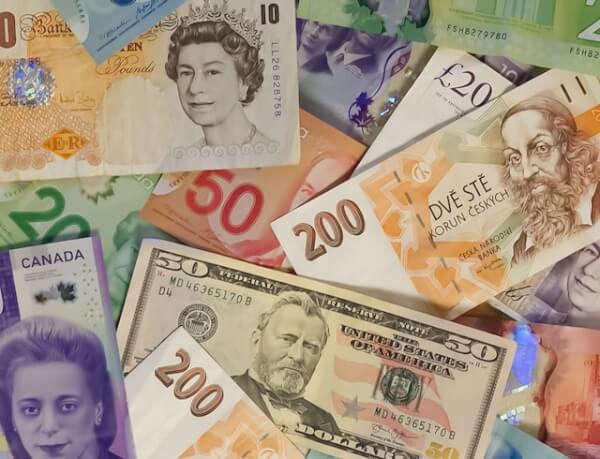We'll lose £215 billion to hidden fees unless we act
We’re set to lose £215 billion to hidden fees this year alone. That's because today, banks and other providers are able to tell you your transfer is free, has...

Millions of us financially support friends and family abroad. But getting that money - so-called remittances - to the other side is much more expensive than it has to be. That’s why in 2015, the United Nations set a Sustainable Development Goal to lower remittances costs to 3% or lower by 2030.
We’ve now published our second annual “Remittance Report” taking a closer look at the progress countries are making towards (not) achieving this goal.
Together with Sandra Sequeira, associate professor of development economics at the London School of Economics, we’ve built a forecast model using World Bank data. Using historical data allows us to forecast future progress. The state of affairs in 2022 is not great:
Three quarters of the biggest sending countries in the G20 are not on track to meet that goal. Since 2015, G20 sending countries have only managed to reduce their average remittance costs by just over 1 percentage point.
Currently, the average is 6.49%, more than double the goal. South Africa is by far the most expensive country, with an average cost of 14.26%, whereas South Korea has already achieved the goal at some points in 2022. The decline has been frustratingly slow in France, which hasn’t seen costs go down since 2016
The rate of progress is too slow and prices are not coming down quick enough. In some countries, prices are even increasing. Why is that? Because providers are allowed to lie about the fees they’re charging their customers.
The World Bank says that the “lack of transparency is the single biggest factor leading to high remittance prices”. This is still the case. The only way to lower costs is to make transparency the norm. Stop allowing banks and money transfer providers to hide fees in terrible exchange rates. It will allow those supporting their loved ones to find the best deal and put downward pressure on prices.
That’s no small scale problem. Remittance volumes and fees people pay are up compared to last year. This year, consumers from some of the biggest remittance sending countries are sending $212 billion to friends and family abroad, but they will have paid nearly $12 billion in fees. Importantly, the friends and family receiving that money could have ended up with $5.3 billion more if countries had already reached the UN SDG of 3% per transfer..
In the midst of the war in Ukraine, the European Commission and the National Bank of Ukraine came together with money transfer companies like Wise, TransferGo and others to launch a pledge. Signatories of this pledge committed to sustaining remittance flows to Ukraine, ensuring prices are below the UN SDG of 3% and are fully transparent - this includes disclosing those pesky hidden fees, usually snuck into an inflated exchange rate.
While this is great news for Ukrainians, many of the important money transfer services like Western Union refuse to sign the pledge.
Wise is already collecting evidence transparency isn’t respected. So far, we’ve only found one traditional bank to be transparent with their customers in Europe. The only way to put that money back into consumers’ pockets is by exposing the rip-off.
Banks will never lower their prices unless they have to. That’s why we shouldn’t wait until 2030 to force this through. Policymakers should find political courage to do the right thing for consumers. G20 governments should commit to action and stop tolerating sneaky fees in inflated exchange rates.
There should be nothing to hide.
Dilip Ratha, Head of KNOMAD and lead economist at the World Bank, says: “This year’s Remittance Report demonstrates that G20 nations urgently need to take decisive action to reduce remittance costs. A decline in costs would allow migrants to send more money home to hundreds of millions of recipients around the world who rely on these funds for food, education and healthcare. Transparent pricing is crucial to lowering remittance costs, and I encourage leaders around the world to act and make this possible. This is too important to neglect.”
*Please see terms of use and product availability for your region or visit Wise fees and pricing for the most up to date pricing and fee information.
This publication is provided for general information purposes and does not constitute legal, tax or other professional advice from Wise Payments Limited or its subsidiaries and its affiliates, and it is not intended as a substitute for obtaining advice from a financial advisor or any other professional.
We make no representations, warranties or guarantees, whether expressed or implied, that the content in the publication is accurate, complete or up to date.

We’re set to lose £215 billion to hidden fees this year alone. That's because today, banks and other providers are able to tell you your transfer is free, has...

From holidaymakers, students funding their student loans, people sending money to support loved ones back home, to small businesses working with overseas...

Chancellor of the Exchequer HM Treasury 1 Horse Guards Road London SW1A 2HQ Dear Chancellor, We are writing to you to take this opportunity to stop hidden...

£187 billion! That’s how much people and businesses lost to hidden fees in a single year.

Share your story with us. Why is sending money abroad important to you? How are hidden fees impacting you and your family? The International Day of Family...

Help change the law! Last year, when sending money abroad, British consumers and businesses lost £5.6 billion in fees. Is it bonkers? Yes! Is it surprising?...